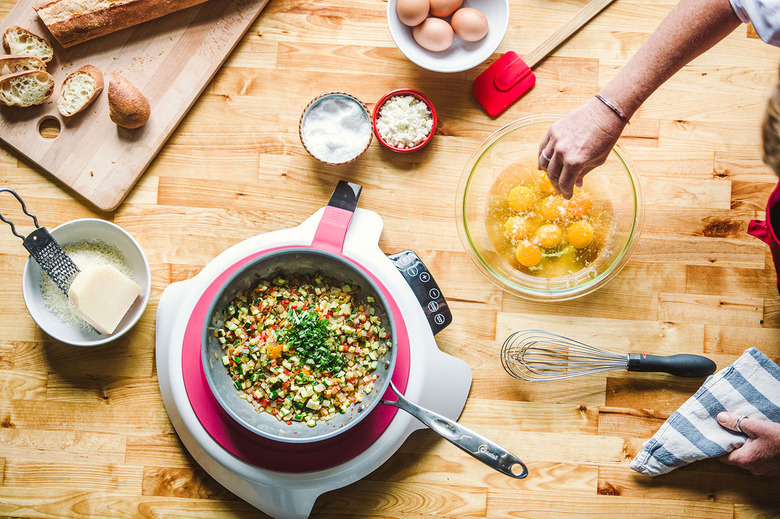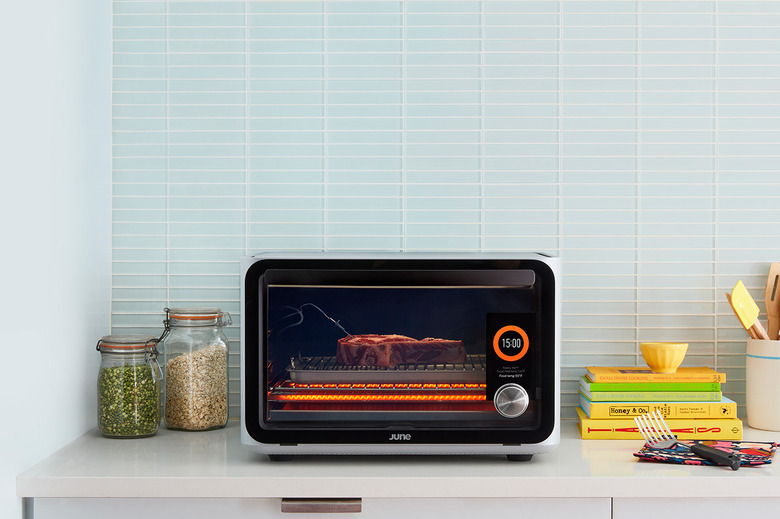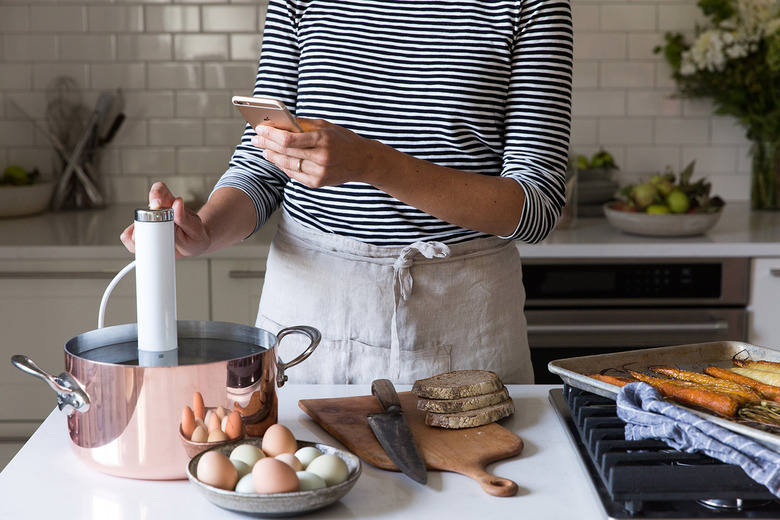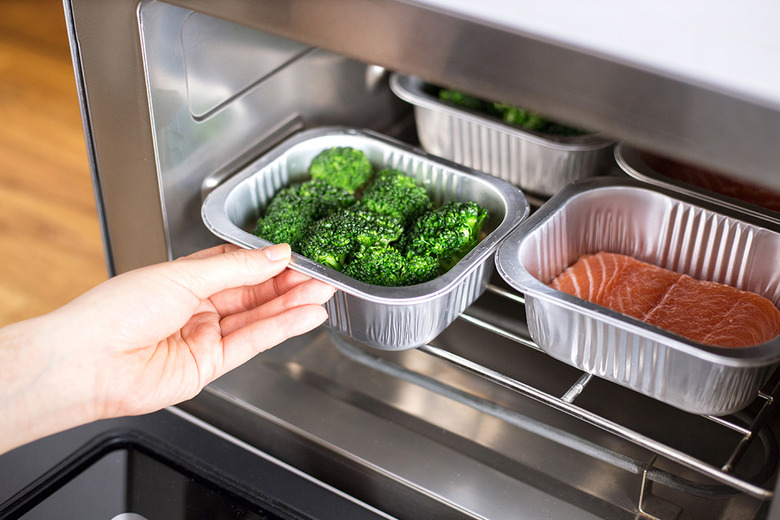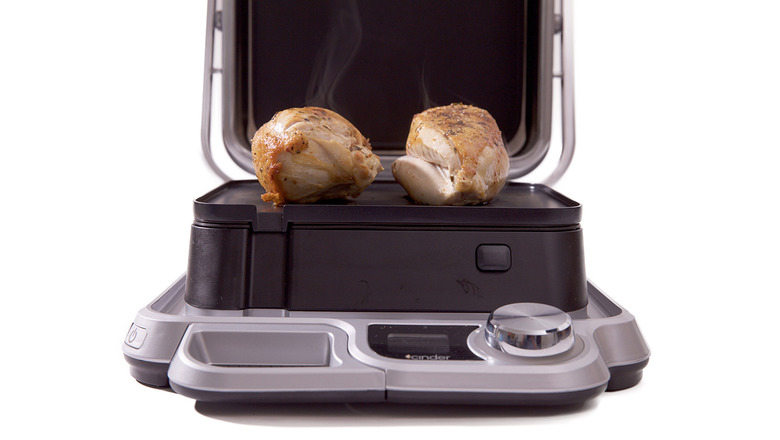Are Smart Cooking Gadgets Worth It?
Can smart cooking gadgets really make you a better cook?
We may receive a commission on purchases made from links.
For some, it was Julia Child who taught them how to put a meal on the table. Later on came Saturday mornings watching Ina Garten or Emeril Lagasse. But for future generations of home cooks, it's not going to be a celebrity chef or even some viral Facebook video that will teach them how to cook dinner: It'll be their kitchen gadgets.
Over the past few years, smart cooking appliances have gone from needless $400 juicers to Internet-savvy devices that promise to churn out meals with minimal effort. They may not be the singing and dancing robot maids prophesied by The Jetsons, but they do claim to make cooking weeknight dinners just a tad easier. But as appealing as that sounds, the question remains: Will they actually make you a better cook?
"Recipes as they exist today are broken," explains Matt Van Horn, cofounder of June, the Apple-esque countertop oven that identifies whatever you're cooking then automatically sets a cook time and temperature instead of requiring one to navigate their way through a complicated set of recipe directions. It's a mindless dinner-making experience that some argue requires little in the way of—you know—actual cooking. But according to Van Horn, this level of hands-free meal prep grants users the freedom to cook things "that they were afraid of doing previously," whether it's a simple roast chicken or something more complicated like salmon.
Look at it this way: You could go the "old-fashion" route and pop open the latest Barefoot Contessa cookbook, but Garten's filet mignon recipe doesn't take into account that your stove burner is weaker than a Viking cooktop, or that you don't actually own the top-of-the-line cast-iron pan Garten likely used in recipe testing. These are all factors seasoned cooks know how to accommodate for, but for the less experienced, it's overwhelming. Smart cookware claims to eliminate this challenge.
This is the guiding principle behind Paragon, a svelte cooktop that uses a probe to keep your pan at an absurdly consistent temperature. Coupled with a phone app, Paragon will personally alert you (in the kitchen of the future, we're all on a first-name basis with our appliances) when it's time to flip your breaded chicken cutlet.
 Photo: FirstBuild
Photo: FirstBuild
"By having a product that can provide repeatable results, it will give people courage in the kitchen," Larry Portaro, director of FirstBuild (the company behind the cooktop), says. Since Paragon knows how to hold your pan at an exact temperature (versus a pan on medium-high heat), something like brown butter—which, no matter how much of a culinary whiz you are, you've scorched at least once—will never burn. "It takes all that stress away as a user; you can dial in a direct temperature, and we'll hold it there for you as you cook."
It's all a far cry from the way most of us were taught to cook. For instance, ChefSteps' Joule sous-vide machine won't tell you to sear your steak the way Bobby Flay does on TV. It'll instead ask you to drop the rib eye into a plastic bag and leave it in preheated water for an hour, before your phone rings to tell you the meat has reached exactly 130 degrees. Experienced cooks might roll their eyes, but Chris Young, founder and CEO of ChefSteps, argues that just because you can't eyeball a medium-rare steak doesn't mean you shouldn't be able to cook a meal as good as someone who spends 80 hours a week in a restaurant kitchen.
 Photo: ChefSteps
Photo: ChefSteps
"There's this false equivalence that every home cook needs to have the same skill set of a professional chef," Young argues. "We have this assumption that unless you're cooking the way a professional chef does, you're doing it wrong." Take it from Young, who's the principal coauthor of Modernist Cuisine, the 50-pound, 2,400-page anthology on molecular gastronomy, and was the founding chef of Heston Blumenthal's science lab-esque Fat Duck Experimental Kitchen in London. For him, smart cooking gadgets aren't dumbing down the art of cooking, but instead giving people the freedom to focus on other aspects of their dinner they normally wouldn't have time for, whether it's focusing on more involved side dishes or tackling a more advanced dish altogether.
As exciting as this all is, these appliances aren't perfect, and your current "dumb kitchen" isn't going away anytime soon. First of all, getting your kitchen a college degree is expensive—a June Oven costs $1,500, while other versions like Cinder, a George Foreman that promises to never overcook your meal, ring in at $500. It's that price barrier, along with the learning curve of smart cookware in general, that has us excitedly talking about them versus bringing them into our own homes. (Coincidentally, these are the exact same obstacles the microwave faced when it was first introduced. It wasn't until a cheaper, more approachable version came along that it became a kitchen mainstay.)
 Photo: June Oven
Photo: June Oven
And aside from the fact that not all gadgets perform their jobs as perfectly as advertised, The Washington Post points out that having a smart kitchen involves juggling between nearly a dozen apps just as much as it involves actual cooking.
Despite the downsides, it's hard to deny these appliances are shaping the future of how we cook and eat—even if you're someone who'd rather live and die by the mortar and pestle. As home-cooked meals become a dying breed (and tiny homes—and kitchens—the norm), these all-in-one gadgets are revolutionizing how we prepare food.
"If we can use technology to take away some of the challenges of cooking and increase the odds you're going to be successful, then hopefully you can rediscover the joy of cooking," Young concludes.
Cookbook author Irma Rombauer's bible—appropriately named Joy of Cooking—might not be leaving our bookshelves just yet, but for the next generation of home cooks, smart cookware is posed to have just as big an impact.
Drop Kitchen Scale
Drop's companion app (which communicates with the scale) guides novice bakers and cooks through step-by-step recipe instructions, and will even resize the entire ingredient list if you find you're short a tablespoon of butter.
Photo: Drop Kitchen
Paragon Cooktop
While traditional cooktops have settings ranging from low to high, Paragon instead uses temperature probes, constantly adjusting the heat to keep your pan at a constant exact temperature.
Photo: First Build
June Oven
June's iOS app lets users control the oven from anywhere; a built-in camera also provides a live view of food as it cooks. If you'd prefer to skip the intelligent aspect, June also works as a normal (albeit expensive) countertop oven.
Photo: June Oven
Pantelligent
A series of sensors built into this nonstick pan's handle connects to your phone, then sends step-by-step alerts telling you when to flip your food or turn down the heat.
Photo: Pantelligent
ChefSteps Joule
For those intimidated by sous-vide cooking, Joule's visually driven app will guide you through every step of the process.
Photo: ChefSteps
Tovala Oven
While combi ovens (ovens that steam as well as bake) are seldom seen outside restaurant kitchens, this countertop model will scan ready-to-cook, delivered meals before determining the proper cooking time and temperature.
Photo: Tovala
Cinder Precision Grill
It looks like a comically oversize George Foreman grill at first glance—and in some aspects, it is—but the Cinder uses an array of temperature sensors to grill food to a sous-vide-like level of precision in a fraction of the time.
Photo: Cinder


